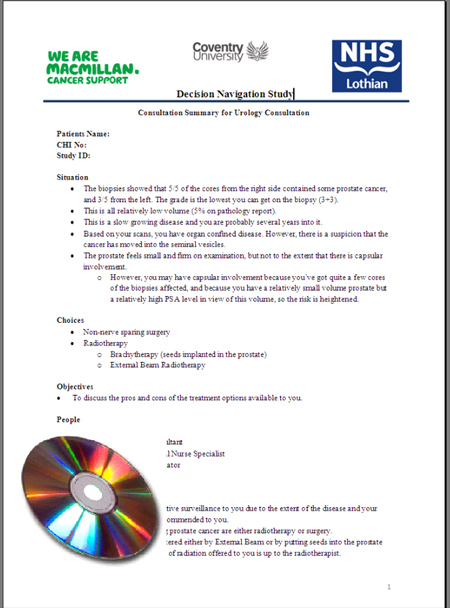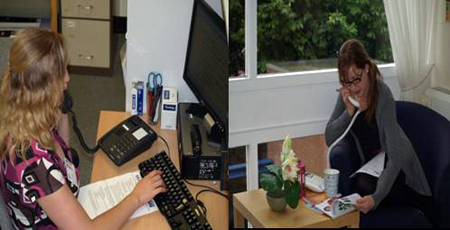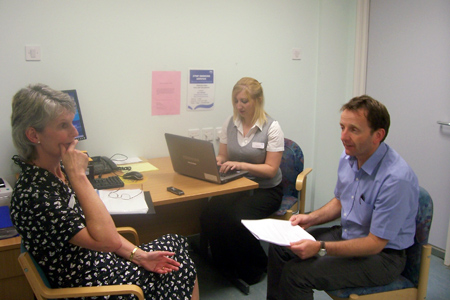BERKELEY, CA (UroToday.com) - The efficacy of a decision/support/intervention/navigation tool for newly diagnosed prostate cancer patients was examined at the Edinburgh Cancer Centre from 2008-2010.
Navigation integrates three evidence-based interventions - question listing, consultation audio recordings, and consultation summary letters. A ‘navigator’ (a researcher trained in navigation) assists patients in creating a personalised question list, or ‘consultation plan’ (Figure 1), to take to their initial specialist consultation where treatment options are deliberated. The creation of the consultation plan is facilitated by a critical reflection model known as SCOPED (www.scoped.org). SCOPED is an acronym that stands for Situation, Choices, Objectives, People, Evaluation, Decisions. As the patient and navigator work through these six categories, key questions, concerns, and objectives are identified and recorded. The ‘consultation plan’ is then sent to the patient’s clinician prior to the consultation.
Navigators accompany patients to the consultation to encourage use of the consultation plan, to take notes on a laptop, and to audio-record the discussion (Figure 2). Subsequently, the patient is provided with an audio CD, and a summary letter of the consultation (Figure 3). The summary is sent to each patient’s general practitioner and a copy held in the medical records.
The impact of navigation was examined using a mixed-method randomised-controlled trial. One-hundred twenty-three patients consented to the study and were randomised to 2 groups (63 navigation and 60 control (usual care)). Our quantitative results showed that those who received navigation experienced greater confidence in their ability to make decisions compared to control patients, immediately following the consultation. This was maintained 6 months later. Navigated patients also experienced less decision uncertainty following the consultation; this difference was not statistically significant at 6-month follow-up. Additionally, those in the navigation group experienced significantly less decision-related regret 6 months later. Navigation did not increase patients’ experiences of anxiety or distress compared to control patients.
Interviews with navigated (n=6) and control patients (n=4) showed that, overall, patients were satisfied with the information provided by their consultant. However, comparison of experiences suggests that navigation further helped patients to organise their thoughts and focus on discussing key issues with their consultant. Navigated patients also felt more able to take decision responsibility and felt that utilisation of the consultation CDs and summaries facilitated the decision-making process, as recall of information pertinent to the decision was made possible.
Evaluation forms from ‘navigated’ patients (n=62) six months later showed that 91.9% (n=57) scored navigation as being “very helpful” and 8.1 % (n=5) “somewhat helpful.” On average, patients referred to the consultation summaries 3 times, and listened to the audio recording twice.
All clinicians involved in the study (n=4) commented that the consultation plans provided them with invaluable foresight into the patient’s personal agenda. They reported that the provision of the audio recording of the consultation was of clear benefit to patients and unanimously supported the integration of navigation into usual care.
Results from the patient and clinician interviews will be reported in forthcoming research papers.
Impact
Following the positive results of this study, the lead urologist at the Edinburgh Cancer Centre obtained funding from The Edinburgh and Lothian Prostate Cancer Support Group and Takeda, a pharmaceutical company, to pilot the provision of consultation audio recordings for newly diagnosed prostate cancer patients. This innovation has received significant media attention in Scotland, including the BBC news.
Future Research
Funding has been awarded for a new project in which Macmillan helpline nurses and support-centre staff will be trained to deliver navigation to newly diagnosed prostate cancer patients attending cancer clinics throughout south east Scotland as part of their current role. This will enable exploration of the scalability of a new service model as well as the efficacy of navigation when delivered by staff working outside the NHS structures.
In this new project, the cost efficacy of navigation will be established by examining health service utilisation of those who received navigation compared to usual care. This will enumerate any attendances/admissions patients had in primary and tertiary care, related to their cancer care. It is hypothesised that those who receive navigation may utilise healthcare services less frequently than those receiving usual care, due to the provision of memory aids (consultation CD and summary) and increased confidence in the decisions taken. Healthcare utilisation data collection is in progress in a current research programme exploring the impact of navigation for colorectal cancer patients.
Sustainability
The success of the navigation projects in Scotland has led to several external parties expressing interest in developing an economically sustainable service model.
Consultation planning is a skill that could be taught to a wider range of healthcare professionals and/or those working for charitable bodies. In America, the Cancer Support Community, an international non-profit organisation, successfully offers consultation planning through an independent call centre. Such a model may reduce the costs of face-to-face provision and open up opportunities for accredited navigators from a number of healthcare backgrounds to provide the service.
Patients report consultation summaries are highly beneficial for accessing complex information easily, aiding recall of treatment details, and allowing them to share accurate medical information with friends and family. Providing consultation summaries is time consuming and labour intensive. However, in the future, patients who receive navigation could be supported by trained volunteers to take their own notes using their consultation CD as a guide.
Enabling the provision of audio recordings of consultations for patients’ personal use could be sourced by low-cost direct payment, or through NHS funds, sponsorship, or charitable grants. Without the provision of a formal consultation summary, observations throughout the projects suggest a consultation recording would be the next best alternative.
Concluding Remarks
Navigation has the potential to improve the engagement of men newly diagnosed with prostate cancer in treatment decisions. New service models are needed to enable the transition of Navigation from research to sustainable service provision.

Figure 3
Written by:
Scott.S.,1, 2 Hacking. B.,1* Wallace. L.M.,2 Belkora. J.,3 and Shepherd. S.C.1,2 as part of Beyond the Abstract on UroToday.com. This initiative offers a method of publishing for the professional urology community. Authors are given an opportunity to expand on the circumstances, limitations etc... of their research by referencing the published abstract.
1Clinical Psychology Department, Edinburgh Cancer Centre, Edinburgh, UK; 2Applied Research Centre in Health and lifestyle Interventions, Coventry University, Coventry, UK; 3Surgery and Health Policy, University of California, San Francisco, USA
*Corresponding Author
Clinical Psychology Department
Edinburgh Cancer Centre
Edinburgh, UK

More Information about Beyond the Abstract




